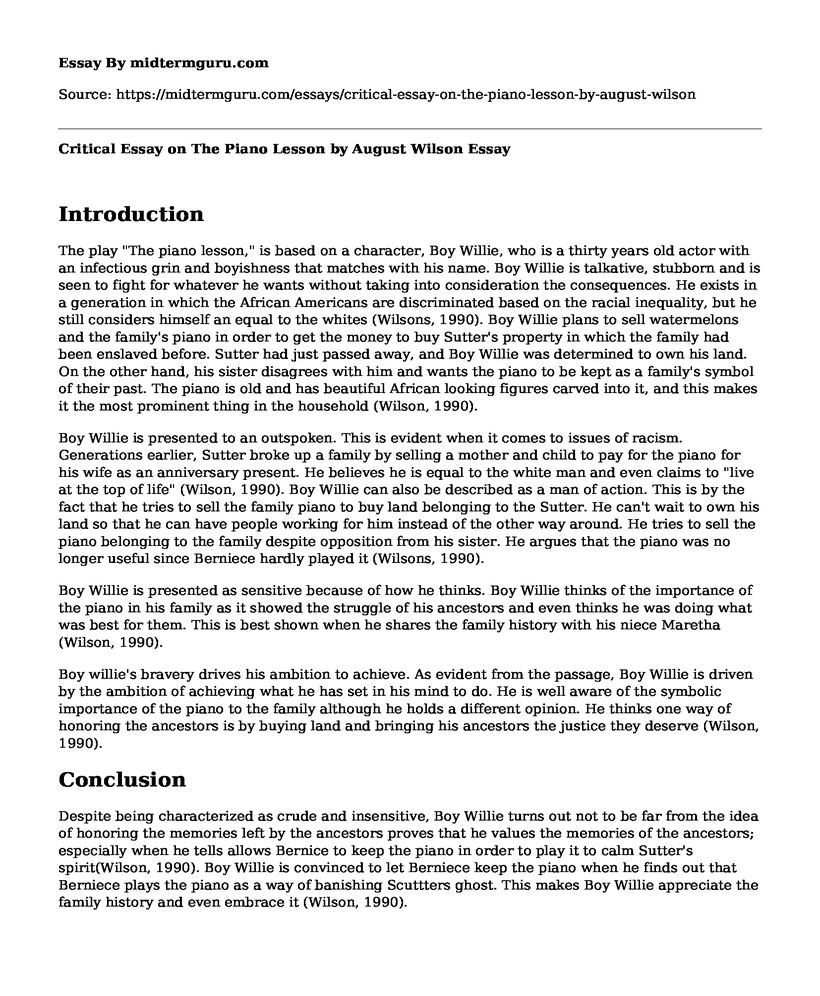Introduction
The play "The piano lesson," is based on a character, Boy Willie, who is a thirty years old actor with an infectious grin and boyishness that matches with his name. Boy Willie is talkative, stubborn and is seen to fight for whatever he wants without taking into consideration the consequences. He exists in a generation in which the African Americans are discriminated based on the racial inequality, but he still considers himself an equal to the whites (Wilsons, 1990). Boy Willie plans to sell watermelons and the family's piano in order to get the money to buy Sutter's property in which the family had been enslaved before. Sutter had just passed away, and Boy Willie was determined to own his land. On the other hand, his sister disagrees with him and wants the piano to be kept as a family's symbol of their past. The piano is old and has beautiful African looking figures carved into it, and this makes it the most prominent thing in the household (Wilson, 1990).
Boy Willie is presented to an outspoken. This is evident when it comes to issues of racism. Generations earlier, Sutter broke up a family by selling a mother and child to pay for the piano for his wife as an anniversary present. He believes he is equal to the white man and even claims to "live at the top of life" (Wilson, 1990). Boy Willie can also be described as a man of action. This is by the fact that he tries to sell the family piano to buy land belonging to the Sutter. He can't wait to own his land so that he can have people working for him instead of the other way around. He tries to sell the piano belonging to the family despite opposition from his sister. He argues that the piano was no longer useful since Berniece hardly played it (Wilsons, 1990).
Boy Willie is presented as sensitive because of how he thinks. Boy Willie thinks of the importance of the piano in his family as it showed the struggle of his ancestors and even thinks he was doing what was best for them. This is best shown when he shares the family history with his niece Maretha (Wilson, 1990).
Boy willie's bravery drives his ambition to achieve. As evident from the passage, Boy Willie is driven by the ambition of achieving what he has set in his mind to do. He is well aware of the symbolic importance of the piano to the family although he holds a different opinion. He thinks one way of honoring the ancestors is by buying land and bringing his ancestors the justice they deserve (Wilson, 1990).
Conclusion
Despite being characterized as crude and insensitive, Boy Willie turns out not to be far from the idea of honoring the memories left by the ancestors proves that he values the memories of the ancestors; especially when he tells allows Bernice to keep the piano in order to play it to calm Sutter's spirit(Wilson, 1990). Boy Willie is convinced to let Berniece keep the piano when he finds out that Berniece plays the piano as a way of banishing Scuttters ghost. This makes Boy Willie appreciate the family history and even embrace it (Wilson, 1990).
Thus, it is evident that Boy Willies role in the pay reveals their family's history and the importance of their past. It also depicts his character as a brother in the family who has the intentions of honoring the ancestors and wanting what's best for the family.
References
Wilson, A. (1990). The Piano Lesson. New York: Plume.
Cite this page
Critical Essay on The Piano Lesson by August Wilson. (2022, Aug 17). Retrieved from https://midtermguru.com/essays/critical-essay-on-the-piano-lesson-by-august-wilson
If you are the original author of this essay and no longer wish to have it published on the midtermguru.com website, please click below to request its removal:
- Essay on The Tower of The Elephant By Robert E Howard
- A Step Away From Them by Frank O'Hara Poem Analysis
- On Living: A Postscript by Stephen King - Literature Essay Example
- Things Fall Apart by Chinua: Funeral Speech - Paper Example
- Sherlock Holmes' Analysis Essay
- Literary Analysis Essay on The Road Not Taken
- Essay Sample on Romeo and Juliet's Death







